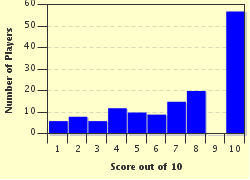Quiz Answer Key and Fun Facts
1. "This above all: to thine own self be true"
2. "If you prick us, do we not bleed?"
3. "Cry 'Havoc!' and let slip the dogs of war"
4. "The course of true love never did run smooth"
5. "Nothing will come of nothing"
6. "All the perfumes of Arabia will not sweeten this little hand"
7. "It is the green-eyed monster which doth mock".
8. "Who wooed in haste, and means to wed at leisure"
9. "Where the bee sucks, there suck I"
10. "Now is the winter of our discontent"
Source: Author
Creedy
This quiz was reviewed by FunTrivia editor
looney_tunes before going online.
Any errors found in FunTrivia content are routinely corrected through our feedback system.


